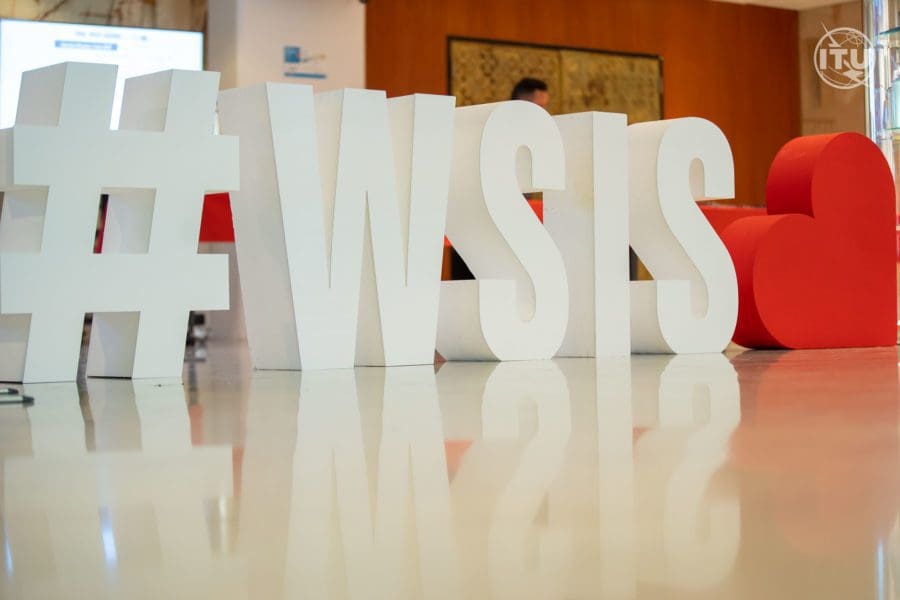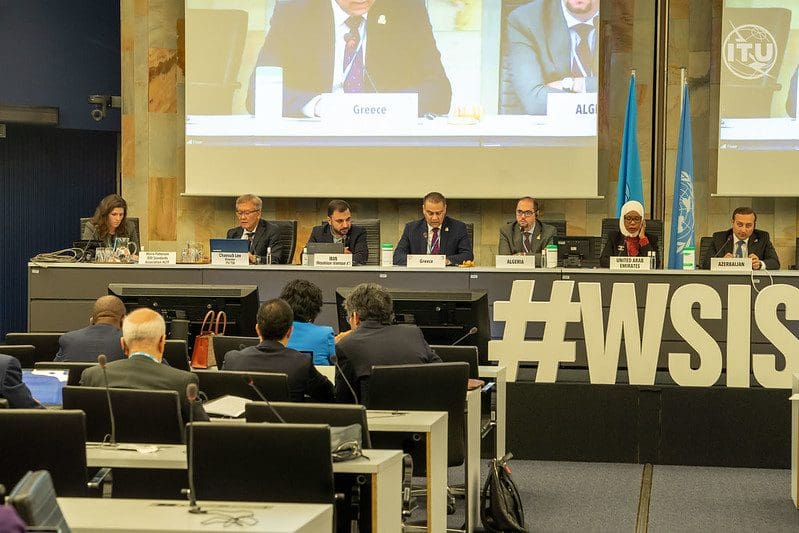The World Summit on the Information Society (WSIS) Forum 2022 was held 15 March through 3 June. The 12 week-long event began with virtual sessions and culminated with the final week being held in person with remote options in Geneva, Switzerland. WSIS is co-organized by ITU, UNESCO, UNDP and UNCTAD, in close collaboration with all WSIS Action Line Facilitators/Co-Facilitators.
WSIS represents the world’s largest annual gathering of the information and communications technology (ICTs) development community. Attendance this year boasted 15K participants from 150 countries and 840 speakers from governments, private sector, civil society, international organizations, United Nations, academia, and the technical community.
The Forum is an information sharing platform with a common purpose to advance development goals.

What is Sustainable Development?
Sustainable development meets the needs of the present generation without compromising the integrity and stability of the natural system for future generations.
Aligned with this objective, IEEE has been participating in the WSIS Forum for several years. At the 2022 summit, IEEE contributed to the inauguration ceremony, hosted two thematic workshops, spoke at four high-level sessions, and held a knowledge café. At all sessions, presentations were made to address the work being done by IEEE that contributes to sustainable development.
Why is Sustainability Important?
UNESCO formulated a distinction between the two concepts as follows “Sustainability is often thought of as a long-term goal (i.e. a more sustainable world), while sustainable development refers to the many processes and pathways to achieve it.”
Climate-related risks to health, livelihoods, food security, water supply, human security, and economic growth are projected to grow as the global mean surface temperature increases from global emissions. There is an urgent need to lower emissions and increase regeneration, restoration and resilience of earth’s ecosystems.
At the IEEE Knowledge Café: Planet Positive: Imagine the Future We Can Build Together held on 02 June 2022, discussions led by thought leaders, Mila Aliana, “Chief Weaver” and Member of Advisory Board IEEE Planet Positive 2030, Maike Luiken, 2022 IEEE Past Vice President Member & Geographic Activities, Bruno Meyer, 2022 IEEE Vice President Technical Activities (TAB), Navroop Sahdev, founder and CEO of The Digital Economist, and moderator John Havens, IEEE Sustainability Practice Lead, explored how technological solutions and innovations can help enable a sustainable future and how we can collectively build a Planet Positive Future for 2030.
What Are the Importance of ICTs with Regard to Sustainability?
High-Level Policy Session 6: Climate Change/Bridging Digital Divides, on 31 May 2022, focused on using ICTs as an instrument for environmental protection and the sustainable production and consumption and the environmentally safe disposal and recycling of discarded hardware and components used in ICTs. Maike Luiken, 2022 IEEE Past Vice President Member & Geographic Activities, addressed two questions.
- How can we make the most effective use of ICT in support of adaptation and mitigation measures addressing climate change, and position us and the planet for a sustainable future?
Luiken stated, “responsible transformation from fossil-fuel to ‘green economies’ is essential to limiting global warming. Progress requires the ability to close innovation gaps, and, most importantly, to share current and future technical knowledge.” IEEE is pursuing a digital technical knowledge commons to address information sharing.
Additionally, optimizing design of infrastructure, equipment, and processes using ICT can reduce energy consumption. For true sustainability, designs must include de-manufacturing into components that can be reused, recycled, or separated into materials that will become feedstock.
- What do you see as barriers to effective use of ICT?
- Lack of access to electricity
- Lack of digital literacy
- Supply-chain uncertainties
- Limited resources
The IEEE Facilitation of High-Level Policy Session 5: ICT Applications and Services on 31 May 2022 covered how ICTs should be used to be used in government, health care, education, employment, business, agriculture, transport, environmental protection, disaster prevention, culture, to promote eradication of poverty and sustainability.
What is Time Sensitive Networking (TSN)?
Data transfer is critical in the effort to create a sustainable future. Ethernet is the most popular communication medium in the world to transmit data between devices. Reliability is key and therefore, time has not been a concept. TSN is an upcoming technology referring to a family of IEEE 802® standards, and its focus is making Ethernet deterministic by design. A deterministic network exchanges data in a precise manner with a defined latency. Until now, this was only possible with proprietary solutions.
TSN is an infrastructure technology that facilitates industry innovation. During the IEEE Thematic Workshop 1: Time-Sensitive Networking on 22 April 2022 panelists, Dr. János Farkas, Research Engineer Ericsson, Silvana Rodrigues, Senior Principal Engineer Huawei, Jordon Woods, Product Line Director Analog Devices, Dr. Abdul Jabba, Principal Engineer GE Research, Max Turner, Automotive Network Architecture Lead Ethernovia, and moderator, Glenn Parsons, Principal Standardization Advisor 5G Transport Ericsson, discussed use cases across various industries. By reserving resources for critical traffic, and applying various queuing and shaping techniques, TSN achieves zero congestion loss for critical data traffic.
Why is Age Appropriate Designing Important?

A sustainable future is not possible without promoting good health and well-being.
At the IEEE Thematic Workshop 2: Is it technically possible to make the digital world age appropriate? on 11 May 2022, moderator, Moira Patterson, Global Market Affairs & Community Engagement Director IEEE Standards Association, and speakers, Teki Akuetteh, ICT/Telecom Lawyer, Julie Dawson, Director, Regulatory & Policy Yoti, and Katina Michael, Professor Arizona State University, explored how to treat children as stakeholders, design with changing technologies, and how to approach different age groups.
A 2019 UNICEF study revealed, globally, 1 out of every 3 Internet users is a child under 18 years of age. 13-17 years of age are often considered “adults” when opening certain accounts, such as social media profiles, without parental consent. This warrants an implicit need to design online experiences with children in mind as consumers.
Alpesh Shah, furthered this discussion on 31 May 2022, during the High-level Strategic Dialogue with Partners on ICTs for Well-Being, Inclusion, and Resilience: WSIS Cooperation for Accelerating Progress on the Sustainable Development Goals. The Senior Director of Global Business Strategy & Intelligence, IEEE SA, covered the critical trends we should be considering with respect to children and technological advancements including:
- children lack the legal status of adults and are vulnerable to the misuse of their data.
- advancements in technologies such as metaverse include meetup functionality.
- artificial use of video, voice, and media present extensible surveillance and bullying opportunities.
- privacy and cybersecurity considerations.
Shah outlined the role the global standardization body, IEEE plays in support of improving children’s digital experiences. For example, developing the Age Appropriate Design Framework IEEE 2089™ Standard led by experts from 5Rights Foundation, Lego, UNICEF, Arizona State University, and many others offers best practices for age-appropriate design. Additionally, the recently released IEEE SA Children’s Online/Offline Case Studies highlight companies that have implemented many of the approaches. IEEE contributions also include training, education, standards, neutral experts, and its AI Ethics Certification program, CertifAIEdTM, for assessing ethics of autonomous intelligent systems (AIS).
Other Special Tracks at WSIS Forum 2022 Included:
ICTs and Youth, ICTs and Gender Mainstreaming, ICTs for Industry 4.0 and Emerging Technologies special track, ICTs for Well-being, Happiness and Peace, ICTs and Accessibility for Persons with Disabilities and Specific Needs, ICTs and Older Persons, ICTs and Indigenous Peoples and Cultures, ICTs for Developing and Least Developed Countries, and ICTs for Sport.
To learn more about WSIS Forum 2022, please visit Highlights and Outcomes.
Watch on-demand participation videos to learn more about IEEE efforts to contribute to sustainable development at WSIS Forum 2022.

